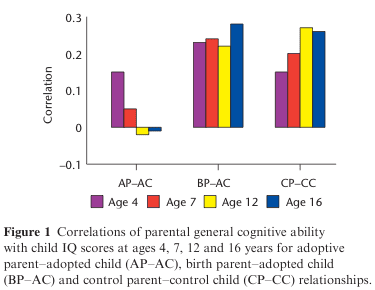Andrew has pointed to Jonathan Livengood’s analysis of the correlation between poverty and PISA results, whereby schools with poorer students get poorer test results. I’d have written a comment, but then I couldn’t have inserted a chart.
Andrew points out that a causal analysis is needed. This reminds me of an intervention that has been done before: take a child out of poverty, and bring him up in a better-off family. What’s going to happen? There have been several studies examining correlations between adoptive and biological parents’ IQ (assuming IQ is a test analogous to the math and verbal tests, and that parent IQ is analogous to the quality of instruction – but the point is in the analysis not in the metric). This is the result (from Adoption Strategies by Robin P Corley in Encyclopedia of Life Sciences):

So, while it did make a difference at an early age, with increasing age of the adopted child, the intelligence of adoptive parents might not be making any difference whatsoever in the long run. At the same time, the high IQ parents could have been raising their own child, and it would probably take the same amount of resources.
There are conscientious people who might not choose to have a child because they wouldn’t be able to afford to provide to their own standard (their apartment is too small, for example, or they don’t have enough security and stability while being a graduate student). On the other hand, people with less comprehension might neglect this and impose their child on society without the means to provide for him. Is it good for society to ask the first group to pay taxes, and reallocate the funds to the second group? I don’t know, but it’s a very important question.
I am no expert, especially not in psychology, education, sociology or biology. Moreover, there is a lot more than just IQ: ethics and constructive pro-social behavior are probably more important, and might be explained a lot better by nurture than nature.
I do know that I get anxious whenever a correlation analysis tries to look like a causal analysis. A frequent scenario introduces an outcome (test performance) with a highly correlated predictor (say poverty), and suggests that reducing poverty will improve the outcome. The problem is that poverty is correlated with a number of other predictors. A solution I have found is to understand that multiple predictors information about the outcome overlaps – a tool I use is interaction analysis, whereby we explicate that two predictors’ information overlaps (in contrast to regression coefficients which misleadingly separate the contributions of each predictors). But the real solution is a study of interventions, and the twin and adoptive studies with a longer time horizon are pretty rigorous. I’d be curious about similarly rigorous studies of educational interventions, or about the flaws in the twin and adoptive studies.
[Feb 7, 8:30am] An email points out a potential flaw in the correlation analysis:
The thing which these people systematically missed, was that we don’t really care at all about the correlation between the adopted child’s IQ and that of the adopted parent. The right measure of effect is to look at the difference in IQ level.
Example to drive home the point: Suppose the IQ of every adoptive parent is 120, while the IQ of the biological parents is Normal(100,15), as is that of the biological control siblings is, but that of the adopted children is Normal(110,15). The correlation between adopted children and adopted parents would be exactly zero (because the adopted parents are all so similar), but clearly adoption would have had a massive effect. And, yes, adopted parents, especially in these studies, are very different from the norm, and similar to each other: I don’t know about the Colorado study, but in the famous Minnesota twins study, the mean IQ of the adoptive fathers was indeed 120, as compared to a state average of 105.
The review paper you link to is, so far as I can tell, completely silent about these obvious-seeming points.
I would add that correlations are going to be especially misleading for causal inference in any situation where a variable is being regulated towards some goal level, because, if the regulation is successful. It’s like arguing that the temperature in my kitchen is causally irrelevant to the temperature in my freezer — it’s uncorrelated, but only because a lot of complicated machinery does a lot of work to keep it that way! With that thought in mind, read this.
Indeed, the model based on correlation doesn’t capture the improvement in the average IQ of what the adoptive child would have if brought up in an orphanage or by unwilling or incapable biological parents (as arguably all children put up for adoption are) vs being brought up in a well-functioning family (as probably all adoptive families are). And comments like these are precisely why we should discuss these topics systematically, so that better models can be developed and studied! As a European I am regularly surprised how politicized this topic seems to be in the US. It’s an important question that needs more rigor.
Thanks for the emails and comments, they’re the main reason why I still write these blog posts.